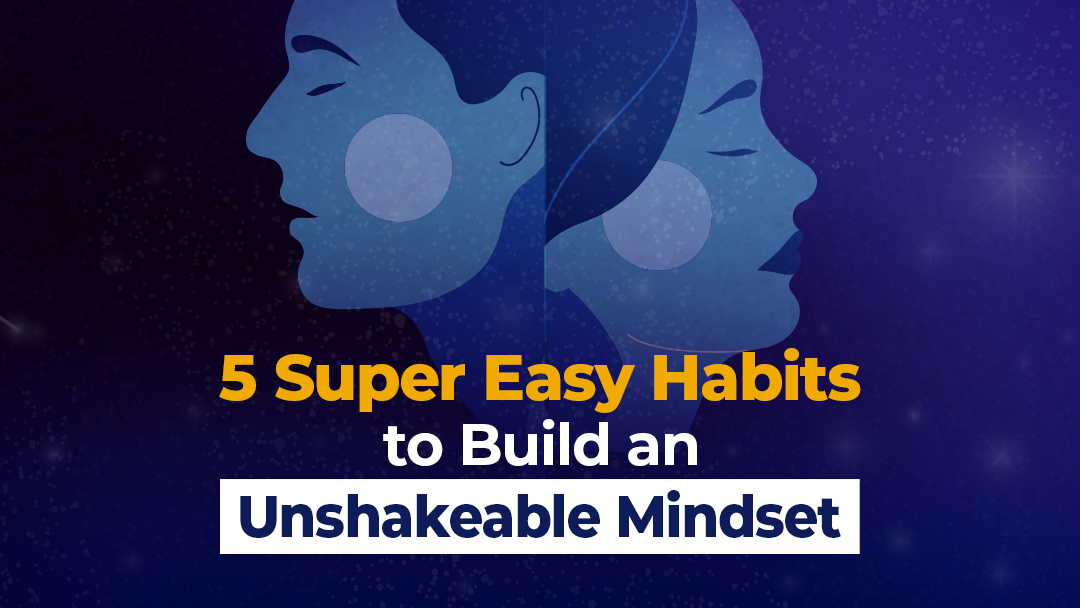Have you ever wondered what sets apart those who crumble in the face of life’s challenges from those who emerge even stronger? How do some people seem to effortlessly bounce back from setbacks while others struggle to regain their footing? In this fast-paced and unpredictable world, is there a way to cultivate mental resilience that can help us not just survive, but thrive?
Join me on a journey to unravel the secrets of an unshakeable mindset as we explore five transformative habits that can empower you to conquer adversities and adopt life’s uncertainties with unwavering strength.
1. Cultivate Gratitude
Gratitude is more than just good manners; it’s a powerful tool for fostering a positive outlook. A 2010 study published in the Journal of Personality and Social Psychology found that practicing gratitude can increase happiness and life satisfaction. Here are some ways to cultivate gratitude:
- Start a gratitude journal
- Practice mindful appreciation
- Express gratitude to others
Dedicate a few minutes each day to write down three things you’re grateful for, big or small.
Throughout your day, take a moment to appreciate the positive aspects of your life, such as a beautiful sunrise, a delicious meal, or a supportive friend.
Let the people in your life know how much you appreciate them. A handwritten note or a heartfelt conversation can make a big difference.
Focusing on the positive aspects of life cultivates optimism and resilience, which serves as a foundation for an unshakeable mindset.
2. Reframe Negative Self-Talk
Our inner voice can be our biggest cheerleader or our harshest critic. Often, we engage in negative self-talk, which can chip away at our confidence and hinder our ability to persevere.
Here’s how to reframe negative self-talk:
- Identify your self-talk
- Challenge those thoughts
- Replace negativity with positivity
Pay attention to the thoughts that run through your mind when faced with a challenge. Are you using words like “can’t,” “shouldn’t,” or “never”?
Ask yourself if these thoughts are helpful or realistic. Would you talk to a friend this way?
Reframe negative thoughts into empowering statements. Instead of “I can’t do this,” try “This is challenging, but I’m capable of learning and growing.”
You build your inner strength and develop a more resilient mindset by consciously replacing negative self-talk with positive affirmations.
3. Adopt Growth Mindset
Stanford psychologist Carol Dweck popularized the concept of growth mindset, which emphasizes the belief that intelligence and abilities can be developed through effort and learning. Conversely, a fixed mindset views intelligence and abilities as fixed traits. Here’s how to cultivate a growth mindset:
- View challenges as opportunities
- Celebrate effort and progress
- Welcome learning
Instead of seeing setbacks as failures, view them as opportunities to learn and grow.
Focus on the effort you put in and the progress you make rather than just the outcome.
Be open to new experiences and challenges; see them as opportunities to expand your knowledge and skill set.
By adopting a growth mindset, you approach challenges with a sense of curiosity and determination, fostering an unshakeable mindset.
4. Practice Mindfulness
Mindfulness is the practice of paying attention to the present moment without judgment. Studies have shown that mindfulness can reduce stress, improve focus, and increase emotional resilience. Here are some ways to practice mindfulness:
- Meditation
- Mindful breathing exercises
- Mindful movement
Dedicate a few minutes each day to meditation. There are many guided meditations available online or through apps.
Take a few deep breaths throughout the day to focus on your present state and release tension.
Activities like yoga or tai chi combine physical movement with mindfulness, promoting relaxation and focus.
By incorporating mindfulness practices into your daily routine, you develop a greater awareness of your thoughts and emotions, allowing you to respond to challenges with a sense of calm and clarity.
5. Build a Support System
No one thrives in isolation. Surrounding yourself with positive and supportive people can make a significant difference in how you navigate life’s challenges. Here’s how to build a strong support system:
- Connect with friends and family
- Seek out a mentor or therapist
- Join a support group
Nurture relationships with loved ones who offer encouragement and support.
A mentor can provide guidance and wisdom, while a therapist can offer professional support for developing mental resilience.
Connecting with others facing similar challenges can provide a sense of community and shared understanding.
Having a supportive network of people to rely on can help you weather difficult times and maintain a positive outlook, strengthening your overall mindset.
Building an Unshakeable Mindset: A Continuous Journey
Building an unshakeable mindset is a journey, not a destination. By incorporating these simple habits into your daily routine, you can cultivate a mental fortitude that empowers you to navigate life’s challenges with greater resilience and a positive outlook.
Here are some additional tips to keep in mind:
-
Be patient and consistent
-
Celebrate your wins
-
Seek inspiration
- Book:Mindset: The New Psychology of Success by Carol Dweck
- Book:The Happiness Project by Gretchen Rubink
- Podcast:The Mindset Mentor by Rob Dial
-
Practice self-compassion
Developing a strong mindset takes time and consistent effort. Don’t get discouraged if you don’t see results overnight. Keep practicing these habits, and gradually, you’ll notice a shift in your perspective and approach to challenges.
Acknowledge your progress, no matter how small. Celebrate the times you reframed negative thoughts, practiced gratitude, or approached a challenge with a growth mindset. Recognizing your successes reinforces positive behaviors and motivates you to continue on your journey.
Read books and articles about developing a strong mindset. Listen to podcasts or watch videos from motivational speakers. Surround yourself with positive influences who inspire you to be your best self. Here are a few resources to get you started:
Be kind to yourself throughout this process. Challenges and setbacks are inevitable. Forgive yourself for missteps and use them as learning experiences to move forward.
Remember, an unshakeable mindset is not about becoming invincible. It’s about developing the mental strength and resilience to navigate life’s inevitable challenges with grace, determination, and a positive outlook.
Do you have any personal strategies for building a strong mindset? Share your tips and experiences in the comments section below! We can all learn from each other on this journey of building unshakeable resilience.
FAQ – Frequently Asked Questions
- What if I struggle with negative self-talk?
- How can I find a therapist or mentor?
- I don’t have a lot of time. Can I still build a strong mindset?
Everyone experiences negative self-talk from time to time. The key is to recognize it and actively challenge those thoughts. Here are some resources that can help: National Alliance on Mental Illness (NAMI): Negative Thoughts, Mayo Clinic: How to Stop Negative Self-Talk
There are several ways to find a therapist or mentor. Consider asking your doctor for a referral, searching online directories, or contacting professional organizations like the American Psychological Association (APA) or the International Coach Federation (ICF).
Even small changes can make a big difference. Start by incorporating just one or two of these habits into your routine, even if it’s just for a few minutes each day. As you become more comfortable, you can gradually add more practice.
Building an unshakeable mindset is an ongoing process. By incorporating these strategies and remaining committed to your growth, you can cultivate the mental strength and resilience to navigate life’s challenges and achieve your goals.
Reach Dr. Chandni’s support team at +918800006786 and book an appointment.










